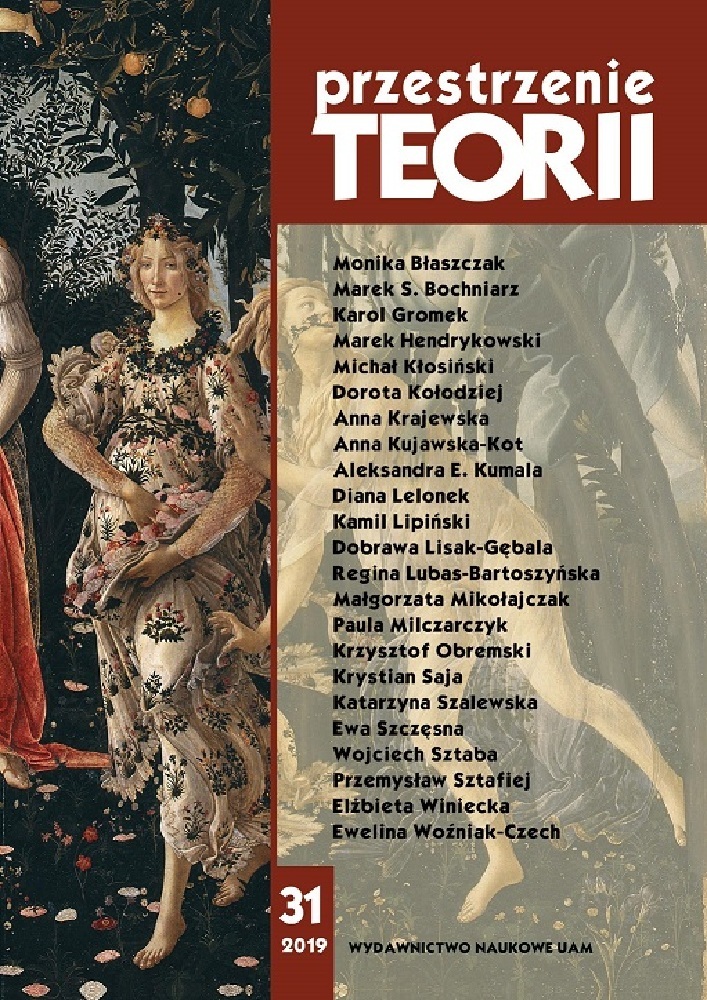Abstrakt
The subject matter of the article is Gilles Deleuze’s considerations on the concept of “any-space whatever” and its application in the cinema and the theater. This space is an outcome of the sensorimotor crisis as the development of Henri Bergson’s conception of duration to determine the potential transformations of modern cinema in the post-war period. It is expressed by a potential singularity that finds its locus in pure optical and sound situations. This conception reveals the correlation between the real and virtual connections defined by a genetic sign which relies upon differentiation. As a space characterized by an affection – image is experienced from its inside to define both disjoint and empty spaces. Such affect often emerges in a range of colors to outline the places marked by emptiness. It is strictly associated with “geometrical” orientation actualizing itself via the qualisign. Thus, this article defines the space in terms of the circuit of virtuality and actuality in time-image which crystallizes both in the cinema and TV dramas of potential exhaustion of three languages in theater performances. Namely, the first one is disruptive and enumerative; the second language consists of voices and combinative flows and the third one reunites the previous ones as the language of images, sounds, and coloring which is a movement between words.
Bibliografia
Bellour R., La chambre, [w:] R. Bellour, L’entre images 2, Paris 1999.
Bensmaïa R., L’«espace quelconque» comme «personage conceptuel», “Iris” 1997, nr. 23.
Chyła W., Gilles Deleuze o filmowym „obrazie-ruchu” i „obrazie-czasie”. Wprowadzenie do lektury książek G. Deleuze’a poświęconych kinu, „Kwartalnik Filmowy” 1993, nr 1.
Conley T., L’événement-cinéma, „Iris” 1997, nr. 23, Deleuze G., Kino. Obraz-czas. Obraz-ruch, przeł. J. Margański, Gdańsk 2009.
Deleuze G., L’Epuisé, suite à Samuel Beckett, postface à “Quad”, de Samuel Beckett, Paris 1992.
Marks L.U., The Skin of the Film. Intercultural Cinema, Embodiment, and the Senses, Durham & London 2000.
Sauvagnargues A., Deleuze et l’art, Paris 2015.
Zourabichvili F., Deleuze et le possible (de l’invontolarisme en politique) [w:] Gilles Deleuze, Une vie philosophique, Paris 1998.
Licencja
Autorzy
Autorzy tekstów przyjętych do publikacji w czasopiśmie „Przestrzeniach Teorii” są zobowiązani do wypełnienia, podpisania i odesłania na adres redakcji umowy o udzielenie nieodpłatnej licencji do utworów, z zobowiązaniem do udzielania sublicencji CC.
Zgodnie z umową, autorzy tekstów opublikowanych w czasopiśmie „Przestrzeniach Teorii” udzielają Uniwersytetowi im. Adama Mickiewicza w Poznaniu niewyłącznej i nieodpłatnej licencji oraz zezwalą na użycie sublicencji Creative Commons Attribution-NonCommercial-NoDerivatives 4.0 International (CC BY-NC-ND 4.0).
Autorzy zachowują prawa do dalszego, swobodnego rozporządzania utworem.
Autorzy, którzy wykorzystują w swoim tekście cudze utwory (np. ilustracje, fotografie) proszeni są o dostarczenie do redakcji czasopisma zgodę na publikację od uprawnionych podmiotów.
Użytkownicy
Zainteresowani użytkownicy internetu uprawnieni są do korzystania z utworów opublikowanych po 2015 roku „Przestrzeniach Teorii” tylko w calach niekomercyjnych, pod następującymi warunkami:
- uznanie autorstwa - obowiązek podania wraz z rozpowszechnionym utworem, informacji, o autorstwie, tytule, źródle (odnośniki do oryginalnego utworu, DOI) oraz samej licencji;
- bez tworzenia utworów zależnych - utwór musi być zachowany w oryginalnej postaci, nie można bez zgody twórcy rozpowszechniać np. tłumaczeń, opracowań.
Do wszystkich tekstów opublikowanych przed 2015 r. prawa autorskie są zastrzeżone.
Inne
Uniwersytet im. Adama Mickiewicza w Poznaniu zachowuje prawo do czasopisma jako całości (układ, forma graficzna, tytuł, projekt okładki, logo itp.).
